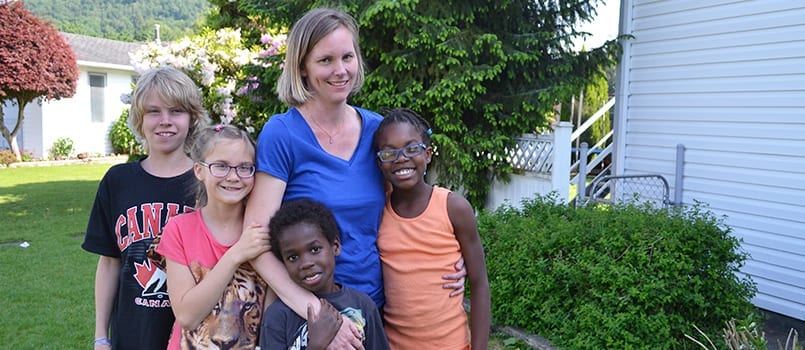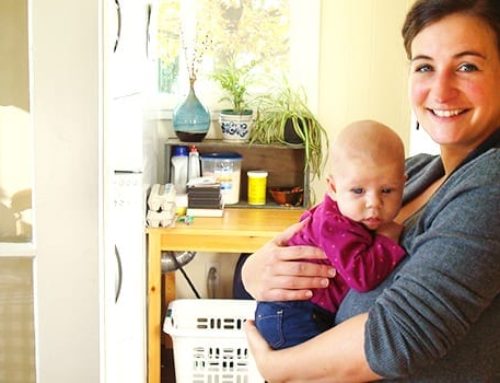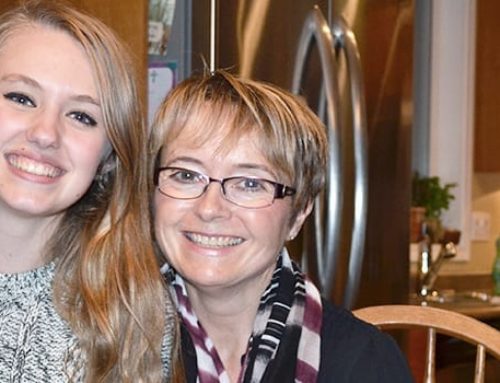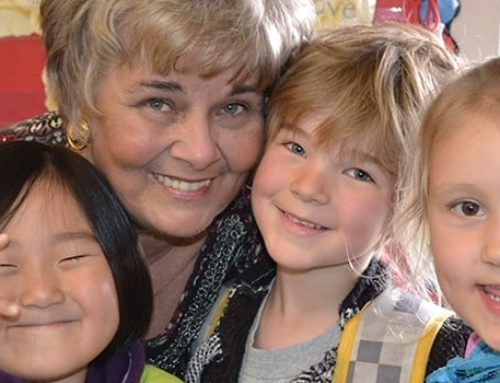by Tanya Kieneker
As I sit down on Kim Fleming’s couch, our kids playing quietly around the house, she jumps right in. She knows the topic of our interview, so it only makes sense that she skips all the pleasantries.
“So here’s a good story. When my mom and dad first got married, they had someone from the church come over and ask them how much they were making. The church then said, ‘OK, this is how much you’ll be giving to the Christian School.’”
Me: Donating?
Kim: Donating!
Ok, she has my attention.
“They didn’t even have any children. And this was on top of what they were giving to the church. The best part is that they moved before their kids ever ended up going to that school. But they were part of that community, therefore they supported Christian education.”
We both agreed that times had changed.

The first School Board of ACS: (back row) G. Ridder, D. Vaandgrager, J. Hoogendoorn (Kim’s great-grandfather), T. Dejong; (front row) O. VanderHoek, H. Advocaat, R. Huizenga
GENERATION #1
Kim’s great-grandfather, her Opa, was very passionate about Christian education. In fact, he was on the very first ACS Board in 1951—two years before the school opened its doors. He and his wife had six sons and five daughters, but by the time ACS began, only the few youngest of his 11 children were able to attend. The rest never experienced Christian education despite their father’s passion.
GENERATION #2
Fast-forward a number of years, and one of the oldest of those 11 children, Kim’s grandfather, helped to start Vernon Christian School. The story goes that one day he said, “Why don’t we get this started?” And they did. But similar to the story of the generation before him, none of his kids went to Christian school—once his kids were school-aged, they moved to a small town with only public education.
GENERATION #3
 Jump ahead another generation and we have Kim’s dad, who was always heavily involved in the Vernon Christian School Board. “My dad said it was funny because he remembers that everyone drove old junkers, but that was totally normal and acceptable because having their kid in Christian education was more important than…. I think that a shift has come. It’s more of an option for people now. It was not then, it wasn’t something that was an accessory for their kids. It was a necessity.”
Jump ahead another generation and we have Kim’s dad, who was always heavily involved in the Vernon Christian School Board. “My dad said it was funny because he remembers that everyone drove old junkers, but that was totally normal and acceptable because having their kid in Christian education was more important than…. I think that a shift has come. It’s more of an option for people now. It was not then, it wasn’t something that was an accessory for their kids. It was a necessity.”
So why were these three men so passionate about Christian education?
“I think it was because they wanted to see God as part of their whole life, not just put into specific areas. God had a part in their job, everything, not just Sundays,” suggests Kim.
GENERATION #4
And now we finally get to Kim. After decades of family commitment and service to Christian education, it was finally the fourth family generation, Kim and her cousins, who were all able to attend Christian school.
“My cousins and I had a real sense of ownership for our school. I remember saying to kids on the swings, ‘I can kick you off of there if I want to because my dad helped build the school!’” Nice Kim. Nice.
As she starts to share more stories about her school days, she comments that a lot of things have changed in education in general since then.
 Example #1: When she was in elementary school, their class used to go down the school field, crawl under a barb wire fence, run across a busy freeway with their skates, all so they could skate on Swan Lake. “You don’t do that anymore. You sign a field trip notice to walk to the park,” she jokes.
Example #1: When she was in elementary school, their class used to go down the school field, crawl under a barb wire fence, run across a busy freeway with their skates, all so they could skate on Swan Lake. “You don’t do that anymore. You sign a field trip notice to walk to the park,” she jokes.
Example #2: In middle school, she and her cousin were the only two girls on the boys’ basketball team because there was no such thing as a girls’ team. Their teacher was a lover of sports—he was really intense about basketball and so a few educational priorities may have been rearranged. “We practiced a lot. During our lunch hour, we would be practicing basketball, but then that would stretch way past lunch. That wouldn’t go over now-a-days. We won though…this little Christian school against the public schools.”
Generation #5
But the story doesn’t end with Kim. After graduating from Trinity Western University with a degree in (you guessed it) education, she moved to Abbotsford with her husband John. They tossed around the idea of enrolling their first-born, Zach, in French immersion at a public school when he started Kindergarten. But that thought ended quickly.
“I had taught at ACS and I knew their philosophy and their feeling behind things. I like how they embraced every child, not just the ones that excel in a certain area. Everybody is a member of God’s family—everybody has a role to play.”
She sees how Christian education shows up in her kids’ little worldviews already—in the stories they come home from school with. She shares that when her daughter Deanna was working on an Explorer project, she had to answer the question “Was he an honourable explorer?” Kim didn’t understand what that meant and Deanna said, “Well, did he just come in and take over, and put in all his own ideas…or did he listen up to what other people had to say?” Kim was impressed that she wasn’t only learning the historical facts, but also discerning Christ-like character in the people involved.
“And not saying that because our kids are at ACS they are going to be these perfect Christians. Shoot! I would pay double if they could guarantee that! But it’s not an angel factory.”
As we wrap up the interview part of our visit (mainly because our “angel” children are hungry), she adds one final thought. “I think it was a different feel back then. It was more about what can I give, than what can this school do for my child. I guess what I’d like to see us all doing with ACS is embracing the school as ‘our school’ and doing our part to make it a better place.”
Point taken. I’m just glad no one is coming to my house later today to ask how much money I make.






WHAT DO YOU THINK?